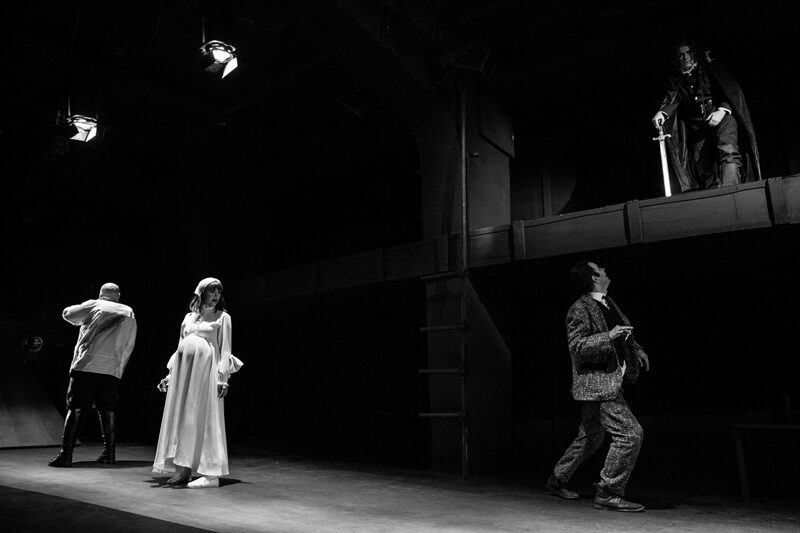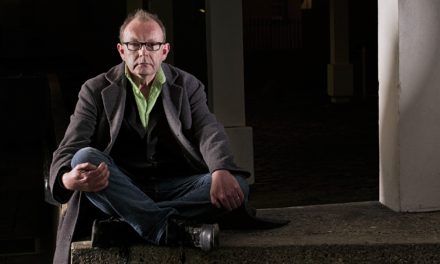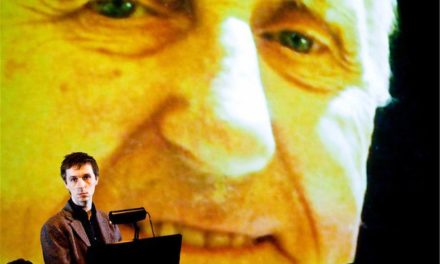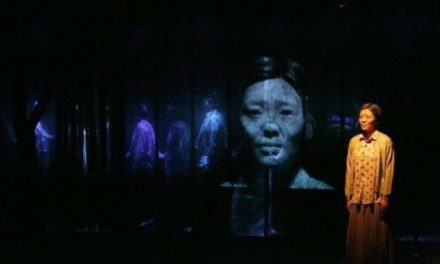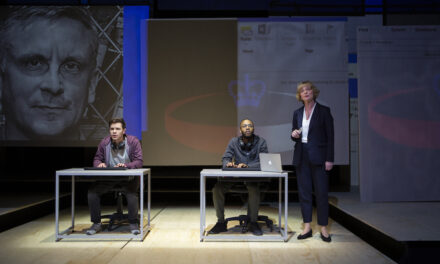Also, about this production, read “Russia Meets Iran: J’afari, Vișniec, and Meyerhold, Partners of Ideology, Traversers of History” by Farinaz Kavianifar.
Ruhollah J’afari, assistant professor, theatre director, critic, researcher, and head of the Guiti Theatre Group is known for bringing to the stage the work of the French-Romanian playwright Matei Vișniec, titled Richard III Will Not Take Place. J’afari has also directed other works of Vișniec in the Sayeh and Chāhārsoo halls of Tehran’s City Theatre, such as Horses at the Window, The Spectator Condemned to Death, and How Can I Be a Bird? Richard III Will Not Take Place is about a director (Meyerhold) in Russia who is unable to obtain a permit for his production. We had a short conversation about the play with J’afari.
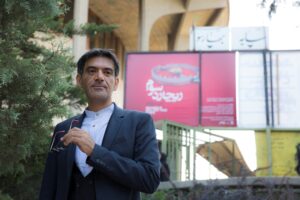
Rūhollah J’afari, director
Reza Ashofteh: It’s been almost ten years since you worked on Vișniec’s plays under the Guiti Theatre Group. Paying close attention to the current societal atmosphere, I’d like to ask why you picked another of Vișniec’s plays for performance.
Ruhollah J’afari: Matei Vișniec was born in Romania in 1956, and his area of study was history and philosophy. Vișniec loved literature, and upon the publication of some of his poetry, he proceeded to write screenplays. Unfortunately, due to the Communist regime of the time, Vișniec’s plays were all banned, and he was forced to seek asylum in France. He is acknowledged as the most famous Romanian playwright, and he believes in a cultural revival, in which theatre and poetry can portray the effects and symptoms of a brainwashed society. The works of this playwright are universal. He works on everyday concepts that do not become outdated. The audience’s observation and discovery of the play are very important to Vișniec, and this importance is by no means a slogan or cliché saying. He surprises his audience in every play that he writes. He creates a world for his audience, which pivots around mankind, and there is no difficulty or conflict in interpreting and understanding these plays. Vișniec creates personas and characters that are grey and multifaceted and that demonstrate his wit and versatile thoughts. Thus, the audience does not face boredom or languish with his work. As a person who is passionate about the art of theatre, the content of a play, the period in which it will be performed, and the audience’s impression of it are extremely important to me. One of the distinguishing factors of theatre is the ability to critique power and politics. The critique of power and politics is present in Vișniec’s works. One of the strengths of this playwright’s work is that he points out these topics in the most subtle and gentle fashion. Vișniec’s works carry the potential to be performed in different time periods, and the Guiti Theatre Group has been performing his plays for around the past 10 years. In the politically heated years of 2009 and 2010, which were similar to the situation we are currently facing, the Guiti Theatre Group performed Vișniec’s works in the venues of the Tehran City Theatre Complex as well. The fact that his plays can be performed in any given era and their compatibility with a society’s needs and challenges portrays the attempt to create a culture of dialogue for his audience; one which transcends race and nationality and is comprehensible for all.
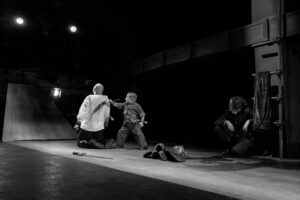
From right to left: Mehdi Bejestāni Reza Alavi, and Mohammad Farajipou, photo by Fahimeh Hekmatandish.
RA: The translator of Richard III Will Not Take Place performed this play in 2016. Why did you choose to perform this play in the year 2018?
RJ: Vișniec sublimely criticizes power in this play, and I felt the need to accurately put this play into performance. Apart from the critiquing of power, there is also a critique of Machiavellian thought in this play. The author intelligently and attractively situates this critique in his play and conveys it to his audience. In this play, Meyerhold sacrifices his own life for the sake of independent art. He doesn’t give in to betrayal. Different censorship agents approach and torture Meyerhold in attempts to force him to surrender, but he resists. His resistance has an outcome, his death. In this play, apart from his governmental confrontation, Meyerhold is also in conflict with the play that he has lost life to and intends to bring to the stage; thus, he doesn’t want to surrender to the customary clichés.
RA: Can one attain a good understanding of Meyerhold, the famous Russian director, from the play you directed?
RJ: You are the one who needs to respond to this question. We should see what perception the audience has of Meyerhold and what they understood from the play.
RA: What is your response to this question?
RJ: Although it’s been 78 years since Meyerhold left us, his thought and work style are growing and being favored amongst the best theatre groups and first-rate artists. To transmit his thought, Matei Vișniec used the presence of Meyerhold in Richard III Will Not Take Place in the best form not only to attribute a religious character to Meyerhold but also to raise the question of why he couldn’t perform Richard III during his time. In order to perform this play, I had to dramaturg it, and in doing so, I was faithful to the author’s wishes. Because of the positive feedback, I received from writers, scholars, artists, and, of course, the audience, I can say that the audience felt at one with what Meyerhold was experiencing.
RA: Censorship and limitation are two main points in this play. With regard to the recent demonstrations, how much would you say this play demonstrates your personal concerns?
RJ: Conducting in-depth research of art history around the world, we can come across an uncountable number of artists who’ve been punished or eliminated for their thought and creativity around the paradoxes of totalitarian regimes and issues of censorship. Richard III Will Not Take Place is one of the most important contemporary plays to address censorship and limitation, and it has shed a realistic light for audiences, without an exaggerated viewpoint, on topics such as Stalin’s Russia. Contemplating such topics and not surrendering for one’s art is any artist’s concern, and so is it mine. In these past years that I’ve been working, I’ve had numerous occasions on which productions were ready for performance but, due to roadblocks placed by individuals who claim to ‘interpret’ the law, were never brought to the stage, and these same individuals hindered my group and me from progressing any further. The government should not turn to censorship or limitations in order to silence an artist merely for his perception, thought, and creativity. If an artist fears censorship and limitation, that fear will take over and result in self-censorship. Self-censorship is castration of ideas for both the artist and his creativity.
RA: The role of the commission officer and the appearances of [Meyerhold’s] mother and father raised much thought and were utilized to present the issue of censorship and limitation in the Soviet Union. Why didn’t you pay attention to all the roles, apart from Meyerhold and Richard, in a similar fashion?
RJ: In this play, everyone from government agents to [Meyerhold’s] mother, father, wife, newborn child, and others intend to convince him that what he believes and thinks is false, and they try to force him to act and think as the government pleases. To portray these different personas from Vișniec’s Richard III Will Not Take Place, I needed different characters and typologies to cast Meyerhold’s thought in the best possible shape. I had an idea of the type and physical appearance of the characters from the first time I read the play. The more I was determined to work on it, the closer I drew to the usage of these character’s appearances and forms that you see onstage. It was an appropriate decision to bring to life the characters and type characters, who join hands in order to censor, slander, and provoke Meyerhold into surrendering and, in other words, castrating his thought. When they fail, they lose hope in Meyerhold and put him to death. All these live characters and type characters play a role in taking Meyerhold to the grave. These various characters and type characters can either be real-life figures or imaginary ones in the mind of Meyerhold. The audience faces a nightmare in this play, one that could break out at any minute in the life of contemporary man, a man who strives for freedom of thought but faces various obstacles for his freethinking.
RA: What were the criteria in role selection for this play?
RJ: I needed an actor who could handle rigorous daily rehearsals that would last for more than six hours a day for a duration of two months. In such performances, an actor who is already occupied with another role will be an unsuccessful candidate. The importance of the actor’s character-building and presence is assessed not by quantity but by their quality, meaning their capabilities to uphold and accurately perform the role they are playing. Actors with a cliché perception of their role would have been unsuccessful because they would have lacked the tools to face the multi-dimensional personas of their assigned role.
Originally published in Persian on Shargh Daily, #32015, Wednesday, August 8, 2018. Reposted with permission. Translated from Persian by Farinaz Kavianifar.
This post was written by the author in their personal capacity.The opinions expressed in this article are the author’s own and do not reflect the view of The Theatre Times, their staff or collaborators.
This post was written by Reza Ashofteh.
The views expressed here belong to the author and do not necessarily reflect our views and opinions.

